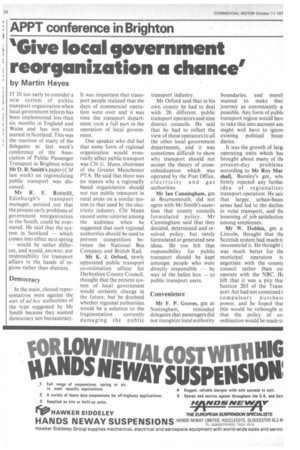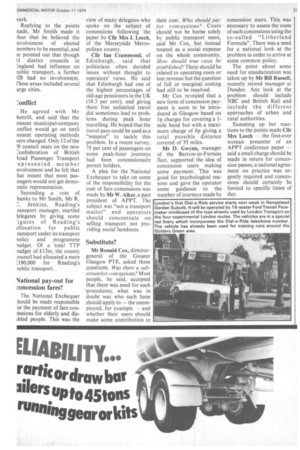'Give local government reorganization a chance'
Page 28

Page 29

If you've noticed an error in this article please click here to report it so we can fix it.
by Martin Hayes
IT IS too early to consider a new system of public transport organization when local government reform has been implemented less than six months in England and Wales and has not even started in Scotland. This was the reaction of many of the delegates at last week's conference of the Association of Public Passenger Transport in Brighton when Mr D. R. Smith's paper (C last week) on regionalizing public transport was discussed.
Mr R. E. Bottrill, Edinburgh's transport manager, pointed out that the present early problems of government reorganization in the South, could be overstated. He said that the system in Scotland — which comes into effect next spring would be rather different, and would, anyway. put responsibility for transport affairs in the hands of regions rather than districts.
Democracy
In the main, elected representatives were against the sort of ad hoc authorities of the type suggested by Mr Smith because they wanted democracy not bureaucracy. It was important that transport people realized that the days of commercial operation were over and it was time the transport department took a full part in the operation of local government.
One speaker who did feel that some form of regional organization would eventually affect public transport was Cilr G. Mann, chairman of the Greater Manchester PTA. He said that there was no reason why a regionally based organization should not run public transport in rural areas on a similar system to that used by the electricity industry. Cllr Mann caused some surprise among the audience when he suggested that such regional authorities should be used to prevent competition between the National Bus Company and British Rail.
Mr K. J. Orford, newly appointed public transport co-ordination officer for Derbyshire County Council, thought that the present system of local government would certainly change in the future, but he doubted whether regional authorities would be a solution to the fragmentation currently damaging the public transport industry.
Mr Orford said that in his own county he had to deal with '26 different public transport operators and nine district councils. He said that he had to reflect the view of those operators to all the other local government departments, and it was sometimes difficult to show why transport should not accept the theory of crosssubsidization which was operated by the Post Office, electricity and gas authorities.
Mr Ian Cunningham, gm at Bournemouth, did not agree with Mr Smith's ascertion that county councils -formulated policy. Mr Cunningham said that they decided, determined and resolved policy, but rarely formulated or generated new ideas. He too felt that responsibility for public transport should be kept amongst people who were directly responsible — by way of the ballot box — to public transport users.
Convenience
Mr F. P. Groves, gm at Nottingham, reminded delegates that passengers did not recognize local authority boundaries, and merel] wanted to make thei journey as conveniently a: possible. Any form of publii transport region would havt to take this into account an( might well have to ignort existing political boun daries.
It was the growth of larg( operating units which ha( brought about many of th( present-day problems according to Mr Roy Mat shall, Burnley's gm, whe firmly rejected any furthe: idea of regionalize( transport operation. He saic that larger, urban-base( areas had led to the decline in rural -transport, and the lessening of job satisfactior among employees.
Mr W. Dobbie, gm al Lincoln, thought that the Scottish system had much tc recommend it He thought i was much better for the municipal operators tc negotiate with the -count) council rather than co. operate with the NBC. H( felt that it was a pity that Section 203 of the Trans. port Act had not contained o compulsory purchase power, and he hoped that this would be rethought sc that the policy of coordination would be made tc vork.
Replying to the points nade, Mr Smith made it ;lear that he believed the nvolvement of elected nembers to be essential, and le pointed out that though II district councils in 'ingland had influence on mblic transport, a further 128 had no involvement. ihese areas included several arge cities.
:onflict
He agreed with Mr 1ottrill, and said that the iresent municipal-company onflict would go on until present operating methods vere changed. Only 12 of the '9 council seats on the new 2onfederation of British toad Passenger Transport epresented member nvolvement and he felt that hat meant that most pasengers would not get demoTatic representation.
Seconding a vote of hanks to Mr Smith, Mr R. -2, Jenkins, Reading's ransport manager, startled lelegates by giving some 'igures of Reading's illocation for public ransport under its transport )olicy and programme )udget. Of a total TIP midget of £13m, the county ouncil had allocated a mere 190,000 for Reading's mblic transport.
National pay-out for oncession fares?
The National Exchequer hould be made responsible or the payment of fare conissions for elderly and disibled people. This was the view of many delegates who spoke on the subject of concessions following the paper by CHI. Mrs J. Leech, of the Merseyside Metropolitan county.
ClIr Ian Crammond, of Edinburgh, said that politicians often decided issues without thought to operators' views. He said that Edinburgh had one of the highest percentages of old-age pensioners in the UK (18.3 per cent), and giving them free unlimited travel did sometimes lead to problems during peak hour travelling. He hoped that the travel pass could be used as a "weapon" to tackle this problem. In a recent survey, 75 per cent of passengers on some peak-hour journeys had been concessionaire permit holders.
A plea for the National Exchequer to take on some of the responsibility for the cost of fare concessions was made by Mr W. Alker, a past president of APPT. The subject was "not a transport matter" and operators should concentrate on selling transport not providing social handouts.
Substitute?
Mr Ronald Cox, directorgeneral of the Greater Glasgow PTE, asked three question's. Was there a substitutelor concessions? Most people, he said, accepted that there was need for such 'procedures; what was in doubt was who such fares should apply to — the unemployed, for example — and whether their users should make some contribution to their cost. Who should pay for concessions? Costs should not be borne solely by public transport users, said Mr Cox, but instead treated as a social expense on the whole community. How should true costs be established? These should be related to operating costs or. lost revenue but the question of full or marginal costing had .still to be resolved.
Mr Cox revealed that a new form of concession payment is soon to be introduced in Glasgow based on p charges for covering a 1mile band but with a maximum charge of op giving a total possible distance covered of 35 miles.
Mr D. Gwynn, manager of the Barrow-in-Furness fleet, supported the idea of concession users making some payment. This was good for psychological reasons and gave the operator some guidance to the number of journeys made by concession users. This was necessary to assess the costs of such concessions using the so-called "Litherland Formula". There was a need for a national look at the problem in order to arrive at some common policy.
The point about some need for standarization was taken up by Mr Bill Russell, recently retired manager at Dundee. Any look at the problem should include NBC and British Rail and include the different approaches of urban and rural authorities.
Summing up her reactions to the points made Cllr Mrs Leech – the first-ever woman presenter of an APPT conference paper — said a small charge should be made in return for concession passes, a national agreement on practice was urgently required and concessions should certainly be limited to specific times of day.




























































































































































